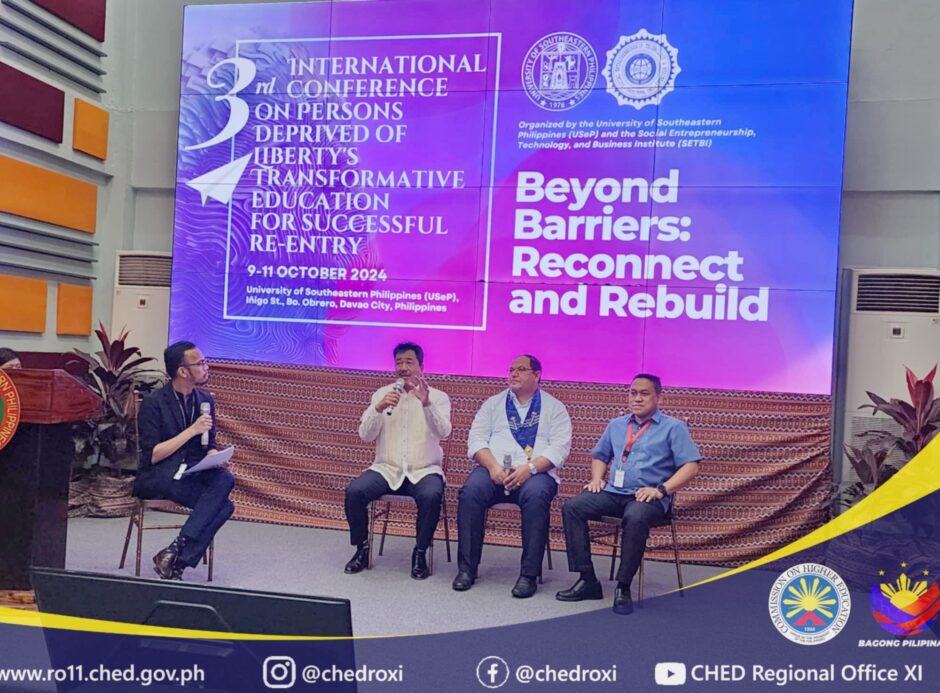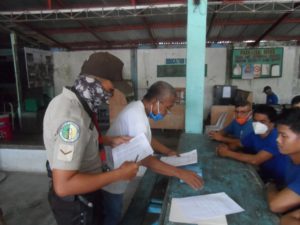
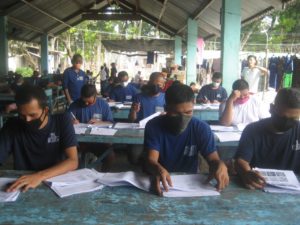
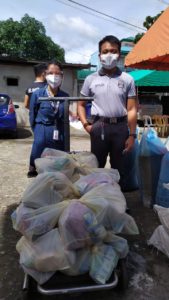
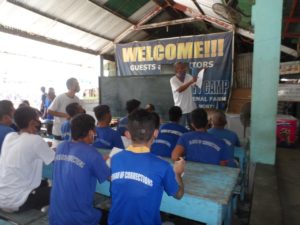 While there has been a lot of media focus on school for the students around the globe for missing learning because of pandemic , there has been not much attention on further education learners missing out and particularly for the learners at the Jails/prisons in the Philippines . From K-12 to students enrolled in higher education, the pandemic has affective the way students are getting their education including the People deprived Liberty( PDL).Just like traditional Colleges, education programs for people inside Jail and DAPECOL have had to make some changes in the wake of the pandemic. Our team at the College Education Behind Bars programs inside Davao City Jail and DAPECOL campus have been working around the clock preparing paper based modules of learning which PDLs can then complete , College Education Behind Bars has transitioned to a correspondence course model until its safe return to in person learning but mean time to continue developing their skills and getting their education for when we all return to normal face to face education. While this ensures that PDLs are able to continue to access their learning, we know that nothing can substitute for face-to-face learning, which is designed to rehabilitate PDLs . Although we don't expect education to look the same as it did before the pandemic. However, we don't want to return simply to business as usual. This is a potentially exciting opportunity to look at the more effective and varied ways of delivering education and other activities .This is particularly important since PDLs currently spend so much time in their cells. In March we were able to flip students at College Education Behind Bars inside the Davao city jail into model paper based learning.
While there has been a lot of media focus on school for the students around the globe for missing learning because of pandemic , there has been not much attention on further education learners missing out and particularly for the learners at the Jails/prisons in the Philippines . From K-12 to students enrolled in higher education, the pandemic has affective the way students are getting their education including the People deprived Liberty( PDL).Just like traditional Colleges, education programs for people inside Jail and DAPECOL have had to make some changes in the wake of the pandemic. Our team at the College Education Behind Bars programs inside Davao City Jail and DAPECOL campus have been working around the clock preparing paper based modules of learning which PDLs can then complete , College Education Behind Bars has transitioned to a correspondence course model until its safe return to in person learning but mean time to continue developing their skills and getting their education for when we all return to normal face to face education. While this ensures that PDLs are able to continue to access their learning, we know that nothing can substitute for face-to-face learning, which is designed to rehabilitate PDLs . Although we don't expect education to look the same as it did before the pandemic. However, we don't want to return simply to business as usual. This is a potentially exciting opportunity to look at the more effective and varied ways of delivering education and other activities .This is particularly important since PDLs currently spend so much time in their cells. In March we were able to flip students at College Education Behind Bars inside the Davao city jail into model paper based learning.
What pandemic has taught all of us that how important technology has become in part of our lives , there for we need to utilize the technology and make it use of it whether people inside jails or outside the jails. If an IPad- or Chromebook -style device is available in cells for a greater number of PDLs , they can access courses , modules, homework, a research portal and more, and be much better prepared for their release. This will help PDLS to improve their skills for the digital world , and they are not going to be outdate and they will be more update when they are free which is a very good news for rehabilitation. According to study report , PDLS involved in any sort of education have a significantly lower reoffending rate on release compared with the those who never had any kind of education.
We are not sure how long this pandemic will continue and it is very important that we make positive innovation now. It is a win- win for everyone – for the PDLs and for the our society.
Some of the people PDLs have experienced a lot of traumas, even before have been detained most of them have experienced severe traumas. Then they experienced more traumas while they have been detained, and then when they are released from the prison or jails they are thrown out into the big scary world that can be traumatic as well. Delivering education into prisons , it can be challenging to meet a wide range of learning and regional needs ; because all obstacles are against PDLS to have education inside prison. The pandemic even make it more harder now. For those PDLs to continue their education that means that they are very serious about the second that chance given to them. We know how transformative education inside prison can be .
Philippine government has very good laws in place but the problems is that implementation of the laws for its purpose is the problem. For example. Social Corporate responsibility , is a good policy that every corporation is mandatory to donate %20 to needy community to help elevate the communities wellbeing , but some of the big companies have found the loophole and came up their own charities try to promote their own interest rather than the interest of the needy community. what if part of this social corporate responsibility , if company hire former PDLs who has gone through College Education Behind Bars programs and get the recommendation letter from the organization change would be a great first step towards convincing employers to take on former offenders, fore example with law firm like Cariaga law firm already showing what can be achieved. Because Cariaga law firm hired many former PDLs who were Student at the college education Behind bars or gone through College Education Behind Bars program and release from the Jails and now some of them continue their education outside at same times they are working full time at the Cariaga law office . According to attorney Cariaga , those former PDLs are the most hard working and kind people that she has worked with. I hope many people like Cariaga law firms will partner with College Education Behind bars and when PDLS student who study at the college education behind bars when they are release they will be able to hire them based on their skills and training . Because the key to stop recidivism is the job and so when many former PDLs get out has hard time to get job and stay on their food, help themselves and their families . It is important to help them guide the provide them job. Meanwhile, having digital devices in cells would allow them to do the off the job training element of the apprenticeship as well. Because College Education Behind Bars helps PDLs to form an integral part of the rehabilitation process , acting as a bridge from prison to working life ion the outside, while simultaneously helping the country address its skills gaps. Yes, they could because we have seen at the Cariaga law firm . We would be delighted to see this introduced and more companies willing to step up. My final pleas to companies would be to talk to us to help the most important part of our community needs . Actually, I think, SETBI have developed innovative solutions already in this area that could be shared more widely with the rest of the community. Meanwhile, if anyone who is willing to be partner and help PDLs access to a digital devices inside the Prison , they will have made an encouraging start.
PDLs with in the criminal Justice system are at varying states of their journey and the College Education may not be applicable to everyone, it could be for those individuals who never had aoppurtunity when he or she outside and very serious about to make right while they are inside the prison and make use of his or her time while inside the jail trying to make right. We want to encourage people and PDLs to open their eyes and change the negative mindsets in order for the real change happen. TI truly believe together we need to move quicker on transforming the prison sector
Without initiative and innovation, prisons are not going to be able to give their PDLs the knowledge and skills they need. The solution for the most traditional colleges is relatively straightforward move traditional classes online. But many prison education programs face technological and bureaucratic challenges to continuing the pandemic term for thousands of PDL students.
College Education Behind bars design to offer formal education Monday – Saturday face -to- face education teaching a range of courses Bs in IT, , BS in Education, BS in social Entreperneurship and business , ,rehabilitation, recovery courses and behaviours can be applied in a real working environment. those who graduate from the College Education Behind bars get diploma from the our Partner Universities , University of Southeastern Philippines , and Davao Del Norte State College ( DNSC) knowledge. To prevent the virus among the inmates who make up one of the populations most vulnerable to the pandemic has become an urgent task for all of us. New restrictions on access to prisons added in response to the virus have pushed us to find the ways to finish the semester. It is now for sure when in- face- to-face classes will return. We are printing pages of course materials to assemble course packs for students. we have assigned person physically driving to all facilities and dropping them off. Plans call for the college to eventually deliver video lectures too and find classroom technology for professors to have direct contact with students even if then cant visit the prison.
We believe the chance to earn a degree behind bars is critical but we cant risk introducing the virus into those facilities. We have several of improvisation at the College Education Behind Bars programs to help students continue classes, likely involving paper based module delivery materials or video lectures, the kind of methods that resemble traditional correspondence courses. Any times a semester is interrupted for reasons that have nothing to do with the actions of the students , it's the our responsibility to help see them through the this kind of crisis . correspondence courses generelaly are more self- paced and have limited interaction between students and their instructor. The major component of college in prison programs in the actual interactions they have with professors and with their peers. It is very critical to maintain momentum of College Education Behind Bars opportunities more broadly even during a public health crisis.
Social Entrepreneurship, Technology, and Business Institute SETBI Partners with Bureau of Jail Management and Penology ( BJMP) and the University of Southeastern Philippines (USEP) having Successful lunched the College Education Behind Bars, the first kind in the Philippines and Asia to provide College Education Behind Bars and constructed a College campus inside Davao City Jail and Davao Prison and Penal Farm. The Social Entrepreneurship, Technology, and Business Institute SETBI, partnered with Dangerious Drug Board (DDB) , and the Bureau of Correction ( BuCor ) has initiated a ( College Education Behind Bars “ Second College Campus at the Davao Prison and Penal Farm. Davao Del Norte State College DNSC, and University of the Southeastern Philippines (USEP).
We strongly believe , the drug problem is a social problem: therefore , it is everybody’s problem, and everybody has responsibility and a role to play. PDLs re-entry begin at the point of their entry into the Prison. And an effective rehabilitation program should be in the placed before PDLs transition from custody into society and begin their new lives. This is what we believe at the College Education Behind Bars, not only ensure that PDL serve their sentences in a safe, secure setting but also return them to their communities and families as restored , reform, rehabilitated and law biding citizens. We have been committed to changing lives, one inmate , one day at a time. A variety of opportunity and outlets are devoted to the pre- release process at the College Education Behind Bars, four year college degree , recovery programs, Senior High Schools degree , Vocational training, faith based courses, life skills development help prepare PDLs for long term success.
This program aims to provide the inmates, both male and female , who are mostly drug dependent and non drug dependent, the means to advance their education in prison. It also offer them a recovery program with their college diplomas, so that if or when they are released, they are fully equipped to go back into society as a contributor to nation building and not a burden to their family ad community . Through the College Education Behind Bars mentoring and recovery program, detainees enhance skills critical to completing a college degree and building trust in personal relationships . both activities significant increase PDLs chances of succeeding when returning to the community . All PDLs students are required to go through a recovery program whether inside or outside . SETBI has already successfully completed fourth year academic year for college and rehabilitation , for the Senior High students , already graduated first batch for senior high students.
This program allows PDLs to earn degree from DNSC/ USEP while serving their prison sentence. In October 2017 , The commission on Higher Education ( CHED) also entered into a Memorandum of Understanding with SETBI for the Possible nationwide expansion of the College Education Behind Bars program. College Education Behind Bars currently offer following programs: Four years college degree programs : BS in IT , BS in Agricultural Business , BS in Food Technology , BS in Social Entrepreneurship , Recovery programs, inside and outside, Senior High Program, Vocational and Technical program, Transition, reentry , and Ready for work program. Four years.
PDL students will study the same university , read same text books, same assignment and complete the equivalent college level assignment as the “outside” when PDL students graduate , they will receive a diploma from the USEP or DNSC for having completed its college program.it will not mention anything about prisons anything. The only differences is that USeP/DNSC professor will travel to the College Education Behind Bars inside the prison or Jail . Before students enroll in the program, the educational professionals will assess and screen detainees for basic literacy and readiness for college and will document their grade level, vocational assessment for college and will document their grade level, vocational assessment needs, length of sentence, and security clearance.
Dr. Aland Mizell is President of the MCI and a regular contributor to Mindanao Times. You may email the author at:aland_mizell2@hotmail.com
